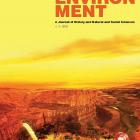Kwashirai, Vimbai Chaumba. “Ecological and Poverty Impacts of Zimbabwe’s Land Struggles: 1980 to Present.” Global Environment 3 (2009): 222–53.
Literature on Zimbabwe’s land struggles is dominated by a particular perspective emphasizing the historical rooting of inequitable land distribution and ownership in British colonial rule from 1890 onward. This view is informed by the imperative of redressing a historical injustice wherever British people alienated prime land from, among others, the indigenous Shona, Ndebele and Tonga. The key element in this perspective has been the science of land management, and particularly the protection of wooded areas, the soil and wildlife. The discourse on ecological calamity stresses the harmful consequences of unregulated agriculture, mining and hunting, the threats posed by degradation, and the need to control methods of resource exploitation. This study examines the debates on, and processes of, land reform in Zimbabwe in the independence era (1980-present), exploring the social, economic and political contexts of perceptions of land redistribution and management. Zimbabwe’s major land reform programme was carried out between 2000 and 2002. An estimated 300,000 small-holder farmers were provided with land holdings ranging between 5 and 10 hectares. In addition, land was set aside for 54,000 black commercial farmers. Of the original 5,000 white farmers in 2000, only 600 were estimated to have remained in full production on their farms. Much of this period has been characterised by both local and global debates about land reform and environmental problems, generating in their wake politically charged and emotive argumentations about issues such as poverty, deforestation, soil erosion and threats to wildlife. (Author’s abstract at The White Horse Press)
All rights reserved. Made available on the Environment & Society Portal for nonprofit educational purposes only, courtesy of Gabriella Corona, Consiglio Nazionale delle Ricerche / National Research Council of Italy (CNR), and XL edizioni s.a.s.


